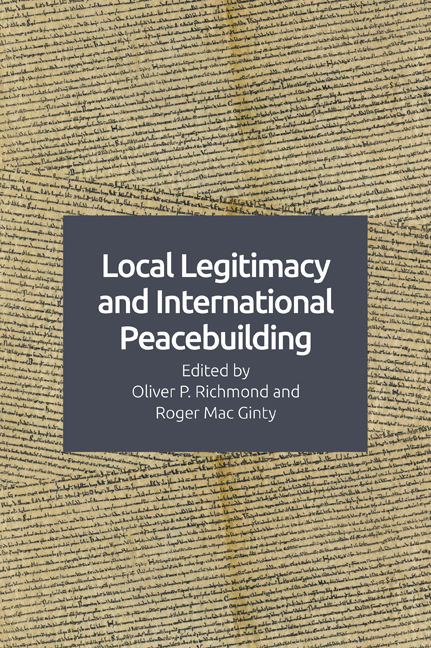Book contents
- Frontmatter
- Contents
- Contributors
- Foreword: The Riddle of Legitimacy
- Introduction: Legitimacy and Peace in the Age of Intervention
- One The Hybridization of Legitimacy in Processes of Peace Formation: the Bougainville Case
- Two International Intervention and Relational Legitimacy
- Three From a Divisive Peace Agreement to a Legitimate Peace in Colombia
- Four Banners, Billy Clubs and Boomerangs: Leveraging and Counter-Leveraging Legitimacy in the Occupied Palestinian Territory
- Five Peacebuilding as a Self-Legitimising System: The Case of Bosnia-Herzegovina
- Six ‘We Are There at Their Invitation’: Struggles for Legitimacy during the US Coalition Invasion–Occupation of Iraq
- Seven Inclusion and Performance as Sources of Legitimacy – the UN Mediation on Syria
- Eight Agonisation to Re-Legitimise the Postcolonial, Post-Conflict Somaliland
- Nine Third Party Legitimacy and International Mediation: Peacemaking through Pan-Africanism in Sudan
- Ten Post-War Legitimacy: A Framework on Relational Agency in Peacebuilding
- Eleven Legitimacy in Lebanon
- Conclusion: Peacebuilding and Legitimacy: Some Concluding Thoughts
- Index
One - The Hybridization of Legitimacy in Processes of Peace Formation: the Bougainville Case
Published online by Cambridge University Press: 17 November 2020
- Frontmatter
- Contents
- Contributors
- Foreword: The Riddle of Legitimacy
- Introduction: Legitimacy and Peace in the Age of Intervention
- One The Hybridization of Legitimacy in Processes of Peace Formation: the Bougainville Case
- Two International Intervention and Relational Legitimacy
- Three From a Divisive Peace Agreement to a Legitimate Peace in Colombia
- Four Banners, Billy Clubs and Boomerangs: Leveraging and Counter-Leveraging Legitimacy in the Occupied Palestinian Territory
- Five Peacebuilding as a Self-Legitimising System: The Case of Bosnia-Herzegovina
- Six ‘We Are There at Their Invitation’: Struggles for Legitimacy during the US Coalition Invasion–Occupation of Iraq
- Seven Inclusion and Performance as Sources of Legitimacy – the UN Mediation on Syria
- Eight Agonisation to Re-Legitimise the Postcolonial, Post-Conflict Somaliland
- Nine Third Party Legitimacy and International Mediation: Peacemaking through Pan-Africanism in Sudan
- Ten Post-War Legitimacy: A Framework on Relational Agency in Peacebuilding
- Eleven Legitimacy in Lebanon
- Conclusion: Peacebuilding and Legitimacy: Some Concluding Thoughts
- Index
Summary
Introduction
For almost a decade (1989–1998), the South Pacific island of Bougainville was the theatre of a violent conflict which cost thousands of lives and led to the large-scale destruction of livelihoods, infrastructure, the economy, political institutions and social structures and relations. It was the longest and bloodiest violent conflict in the South Pacific after the end of the Second World War. After a cease-fire came into effect in April 1998, long-term processes of peace formation and state formation commenced, which continue today.
A host of actors and institutions at the local societal level, the regional and national political level, as well as the international level, have been involved in these processes. They all lay claim to legitimacy, and they all – more or less – enjoy legitimacy in the eyes of the people on the ground. Multiple legitimacies are grounded in different normative frameworks though. Hence, empirical legitimacy as it is emerging in the course of peace formation and state formation, and as it is shaping peace formation and state formation, is hybrid legitimacy, with contradictory and seemingly mutually exclusive sources and forms of legitimacy intertwining and blending.
In the following, we’ll explore this uneasy co-existence, interaction and mutual permeation of different sources and types of legitimate authority in Bougainville peace and state formation, arguing that the hybridisation of legitimacy as an ongoing process is an essential characteristic of the emerging peace and state, which emerge as hybrid themselves, and arguing that this hybridity of legitimacy, rather than being an obstacle and hindrance, is the foundation of sustainable peace and resilient political community. This has far-reaching implications for international peacebuilding actors; they have to acknowledge the limitations of their own liberal understandings of legitimacy and constructively engage with the hybridization of legitimacy.
With Max Weber, we understand legitimacy in an empirical sense, as the belief in the right to govern (or to build peace), and the belief in the rightfulness of certain acts of governance (or acts of peacebuilding). It is this empirical legitimacy in the domestic realm that matters in peace and state formation, not so much international normative legitimacy.
- Type
- Chapter
- Information
- Local Legitimacy and International Peace Intervention , pp. 19 - 43Publisher: Edinburgh University PressPrint publication year: 2020



